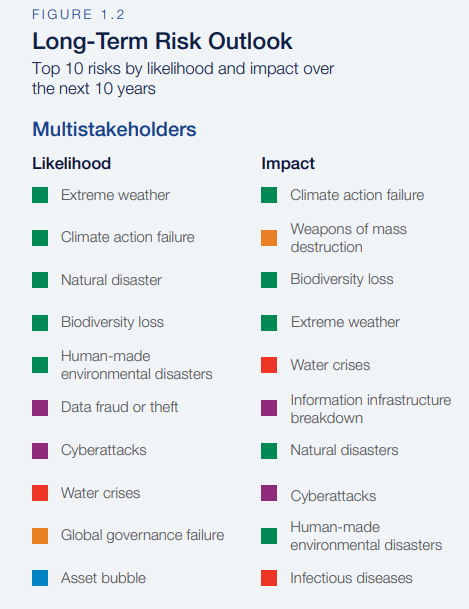UN Climate Change News, 17 January 2020 - The World Economic Forum is sounding the alarm bells on climate change, with its annual Global Risks Report showing that environmental risks are for the first time among the top five long-term concerns, with fears of a climate breakdown now dominating.
The report names failure to cut greenhouse gas emissions and adapt to climate change, along with the loss of biodiversity, as key concerns for the Forum’s network of business leaders, NGOs, academics and others. This group of people places climate change as the number one risk by impact and number two by likelihood over the next 10 years.

In an introduction to the report, Børge Brende, President of the World Economic Forum said:
"On the environment, we note with grave concern the consequences of continued environmental degradation, including the record pace of species decline. But despite the need to be more ambitious when it comes to climate action, the UN has warned that countries have veered off course when it comes to meeting their commitments under the Paris Agreement on climate change."
Released ahead of the World Economic Forum’s Annual Meeting in Davos, taking place from 21 to 24 January, the report urges governments and organizations to address the impact of specific threats and make preparations to contain potential fallout.
The report points out that for future efforts to cut greenhouse gas emissions, 2020 is a critical year, given that it presents the first opportunity for nations to revise their national plans to tackle climate change as set out under the 2015 Paris Climate Agreement.
And the report points to the increasing number of governments announcing long-term net-zero emissions goals and showing more interest in tackling outstanding challenges in developing potential low-carbon solutions.
The authors also highlight the fact that over 40 central banks and supervisors are already examining how climate risks can be integrated into their economic and financial activities.
For example, the Bank of England has warned that corporations in incumbent fossil fuel industries can expect to go bankrupt if they fail to understand the risk of their business models becoming obsolete as investment migrates to net-zero-emission alternatives.
Read the full report here.
